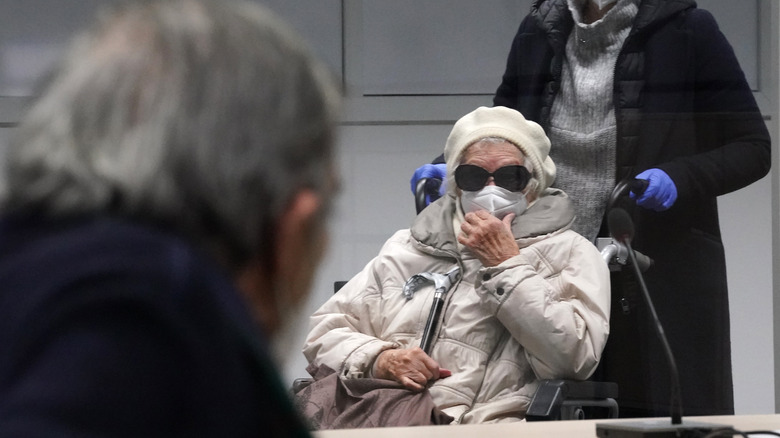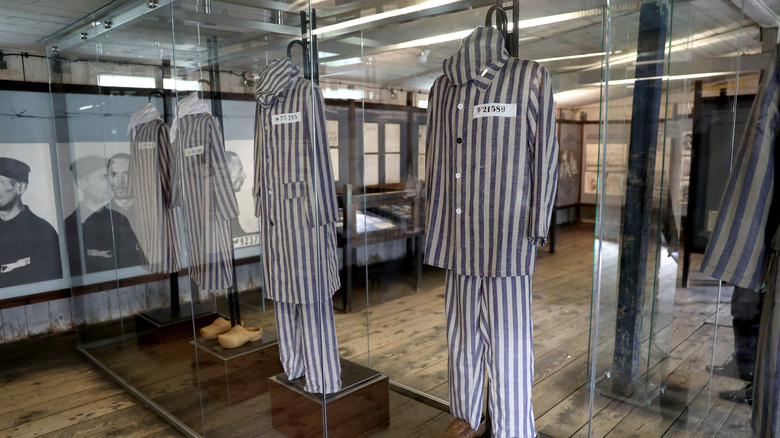The 97-Year-Old Nazi Secretary Sentenced For Her Involvement In Over 10,000 Murders
In 1939, the Nazis originally built Stutthof, located just east of Danzig in modern Poland as a prison to house political enemies. Two years later, it became a special camp for the Schutzstaffel (SS), and in January 1942, Stutthof officially became a concentration camp (per Yad Vashem). According to Jewish Gen, the camp initially had eight barracks for inmates, and 30 more barracks, as well as a gas chamber and crematory, were added later on.
One of the survivors of the concentration camp, Manfred Goldberg, told BBC News about his experience. He was sent to the camp in 1943 as a 13-year-old boy for slave labor. According to him, he spent time with hundreds of other prisoners repairing railway tracks that were destroyed by the Allied forces. He was then sent to two other camps before he was brought back to Stutthof in 1944. By the end of World War II in September 1945, Yad Vashem estimates that a total of 115,000 prisoners came to Stutthof, with 22,000 transferred to other concentration camps while 65,000 of the prisoners died at Stutthof. Of those that perished at Stutthof, they died in the gas chamber, lethal injection, of starvation, or illness (per The Washington Post).
In December 2022, one of the people who worked at the concentration camp was convicted of being an accessory to more than 10,000 murders at Stutthof.
She fled before her trial
Irmgard Furchner was just 18 years old when she started working as a secretary at the Stutthof concentration camp. According to The Guardian, the charge against Furchner came after former concentration camp guard John Demjanjuk was convicted in 2011 of aiding in the murder of thousands of people."The verdict sends a very powerful message that even many years after the crime of the Holocaust, the perpetrators can be brought to justice," Efraim Zuroff, a Nazi hunter and historian, told Nevada Appeal about Demjanjuk's conviction. In recent years, Oskar Gröning, who The Washington Post notes was an accountant at the Auschwitz concentration camp, was also convicted.
After an investigation that began in 2016, Furchner was charged in 2021 in northern Germany by the Regional Court of Itzehoe (per The Washington Post), with 11,412 counts of accessory to murder and 18 counts of accessory to attempted murder. On the day of her trial, however, she didn't appear in court. She left the care home where she resided early in the morning prior to the trial date and traveled via taxi to the metro station (via The Guardian). A warrant for her arrest was issued, and she was apprehended a few days later. A doctor examined the then 96-year-old Furchner to check whether she was healthy enough to be detained by authorities. Since she was just 18 and 19 years old when she worked as a civilian at the Stutthof concentration camp, it was decided to try her in a juvenile court.
Irmgard Furchner was found guilty
The prosecution stated that although Irmgard Furchner didn't directly kill people with her own hands, she was aware of what was happening at the concentration camp and willingly did her duties as the personal typist and stenographer of Stutthof's commander, as noted by The New York Times. Furchner's defense team argued that it couldn't be proven beyond a reasonable doubt that Furchner was, indeed, knowledgeable and culpable of the killings while she worked at the camp. However, one of the survivors noted that it would have been impossible for her not to know what was going on as soon as she stepped into Stutthof. The German media dubbed Furchner "the secretary of evil." Prosecutor Maxi Wantzen stated that she couldn't have missed the smoke that emitted from the crematoriums or "not notice the smell of burned corpses." Additionally, she would have been able to see the thousands of prisoners entering the camp through her office window.
Holocaust survivors shared their experiences as Furchner quietly sat in a wheelchair all throughout the trial. It was only at the end that she spoke and said, "I am sorry for everything that happened. I regret that I was in Stutthof at that time." Per The Washington Post, Furchner served as a witness in several cases brought against former Nazi officials during the 1950s. During the testimonies she gave at that time, she stated that she saw many of the letters for Stutthof Commandant Paul Werner Hoppe and that she was responsible for typing out execution orders given by Hoppe. As reported by AP News, Furchner, 97 years old, was found guilty of being an accessory to 10,505 murders and an accessory to five cases of attempted murder at the concentration camp and was given a suspended sentence of two years.


